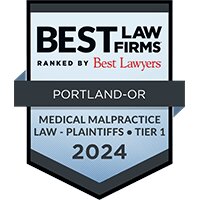Best Construction Accident Lawyers in Oregon
Share your needs with us, get contacted by law firms.
Free. Takes 2 min.
Or refine your search by selecting a city:
List of the best lawyers in Oregon, United States
About Construction Accident Law in Oregon, United States
Construction accident law in Oregon governs the rights and responsibilities of workers, employers, property owners, and other parties when an injury occurs at a construction site. Due to the inherent risks in construction jobs, such as working at heights, handling heavy machinery, and exposure to hazardous materials, construction sites are among the most dangerous work environments. Oregon law provides specific protections for workers injured on the job, whether through workers’ compensation, claims against at-fault third parties, or other legal actions. Understanding your rights and obligations is essential if you or someone you know is hurt in a construction accident in Oregon.
Why You May Need a Lawyer
After a construction accident, individuals often face physical, emotional, and financial challenges. Navigating the legal aspects without professional help can be overwhelming, especially if the injury is serious or if there is a dispute over benefits or liability. You may need a lawyer in situations such as:
- Your workers’ compensation claim is denied or delayed
- The settlement offer does not cover all your medical bills or lost income
- You believe a third party, such as an equipment manufacturer or subcontractor, is responsible for your injury
- The employer is pressuring you not to file a report or claim
- The accident resulted in long-term impairment or disability
- There are questions about workplace safety violations
An experienced construction accident attorney can help you understand your rights, pursue fair compensation, and ensure all responsible parties are held accountable.
Local Laws Overview
Oregon has specific laws and regulations that apply to construction accidents. Some key aspects include:
- Workers’ Compensation: Most employers in Oregon are required to carry workers’ compensation insurance. This provides benefits to employees injured on the job, regardless of fault. However, workers’ compensation may not cover all damages, like pain and suffering.
- Third-Party Claims: If a third party, such as another contractor or equipment manufacturer, contributed to the accident, you may be able to file a lawsuit against them for additional damages.
- Occupational Safety and Health (OSHA) Standards: The Oregon Occupational Safety and Health Administration (Oregon OSHA) sets safety requirements for construction sites. Violations of these rules can be evidence of negligence.
- Statute of Limitations: In Oregon, there are strict deadlines for filing injury claims. Generally, you have two years from the date of the accident to file a personal injury lawsuit, though workers’ compensation claims must be reported much sooner.
- Comparative Fault: Oregon uses a modified comparative fault system. If you are partially responsible for your injury, your compensation may be reduced, but you can still recover damages as long as you are not more than 50 percent at fault.
Frequently Asked Questions
What should I do immediately after a construction accident in Oregon?
Report the accident to your employer or supervisor right away, seek medical attention, and document the incident with notes and photos if possible. Prompt reporting is crucial for both medical and legal reasons.
Am I eligible for workers’ compensation after a construction accident?
Most construction workers in Oregon are covered by workers’ compensation. This applies to employees regardless of fault, but independent contractors usually are not covered under workers’ comp unless they have arranged their own coverage.
Can I sue my employer for a construction site injury?
In most cases, workers’ compensation is your exclusive remedy against your employer for workplace injuries. However, you might have a separate claim if intentional harm or gross negligence is involved, or if a third party contributed to the accident.
What types of compensation can I receive from a construction accident claim?
You may receive compensation for medical expenses, lost wages, rehabilitation costs, and permanent disability. A separate lawsuit against a third party may also include damages for pain and suffering and other non-economic losses.
What if I was partially at fault for the accident?
Under Oregon’s comparative fault rule, you can still recover damages as long as you are not more than 50 percent at fault. However, your compensation will be reduced by your percentage of fault.
Do I need a lawyer to file a construction accident claim?
While it is possible to file a claim on your own, legal representation can be highly beneficial, especially for complex cases, disputed claims, or severe injuries. A lawyer ensures your rights are protected and can help maximize your compensation.
How long do I have to file a claim after a construction accident in Oregon?
Workers should report injuries to their employer as soon as possible, usually within 90 days. The statute of limitations to file a lawsuit for personal injury is typically two years from the date of the accident.
Can undocumented workers seek compensation for construction injuries?
Yes, Oregon law does not exclude undocumented workers from workers’ compensation benefits. All employees have the right to workplace safety and compensation for job-related injuries.
What if my workers’ compensation claim is denied?
If your claim is denied, you have the right to appeal through the Oregon Workers’ Compensation Board. An attorney can help you navigate the appeals process and gather necessary evidence.
Are all injuries at construction sites eligible for compensation?
Not all injuries are compensable. There must be a direct connection to your work duties, and injuries resulting from intoxication or rule violations may be excluded. Consulting an attorney can help clarify eligibility based on your situation.
Additional Resources
Oregon Workers’ Compensation Division - Provides information, forms, and assistance related to workers’ compensation claims in Oregon. Oregon Occupational Safety and Health Administration (Oregon OSHA) - Offers resources on workplace safety standards and investigates safety violations. Oregon State Bar Lawyer Referral Service - Connects individuals with certified attorneys experienced in construction accident cases. Oregon Building Trades Council - Advocates for the rights of construction workers and offers information on workplace safety and rights. Legal Aid Services of Oregon - Provides free or low-cost legal assistance for qualifying individuals dealing with workplace injuries or disputes.
Next Steps
If you have been injured in a construction accident in Oregon, here are the steps you can take to protect your rights and seek proper compensation:
- Report the accident to your employer or supervisor immediately.
- Seek medical attention and keep records of all diagnoses, treatments, and expenses.
- Document the circumstances of the accident, including photos, witness statements, and safety issues.
- File a workers’ compensation claim as soon as possible.
- Contact a knowledgeable construction accident lawyer to discuss your case, especially if you face resistance from your employer or insurance, or believe a third party may be liable.
- Consult additional resources or support organizations if you need further information or advocacy.
Prompt action and expert legal guidance can help ensure you receive the benefits and compensation you deserve after a construction accident in Oregon.
Lawzana helps you find the best lawyers and law firms in Oregon through a curated and pre-screened list of qualified legal professionals. Our platform offers rankings and detailed profiles of attorneys and law firms, allowing you to compare based on practice areas, including Construction Accident, experience, and client feedback.
Each profile includes a description of the firm's areas of practice, client reviews, team members and partners, year of establishment, spoken languages, office locations, contact information, social media presence, and any published articles or resources. Most firms on our platform speak English and are experienced in both local and international legal matters.
Get a quote from top-rated law firms in Oregon, United States — quickly, securely, and without unnecessary hassle.
Disclaimer:
The information provided on this page is for general informational purposes only and does not constitute legal advice. While we strive to ensure the accuracy and relevance of the content, legal information may change over time, and interpretations of the law can vary. You should always consult with a qualified legal professional for advice specific to your situation.
We disclaim all liability for actions taken or not taken based on the content of this page. If you believe any information is incorrect or outdated, please contact us, and we will review and update it where appropriate.
Browse construction accident law firms by city in Oregon
Refine your search by selecting a city.










